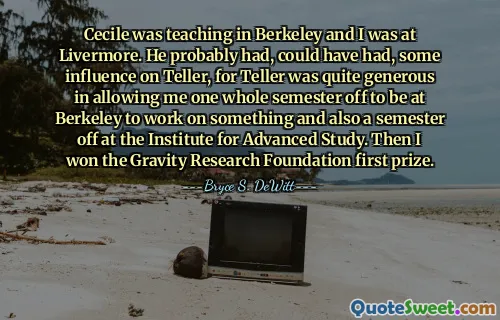Bryce S. DeWitt was a prominent American physicist known for his significant contributions to the field of quantum gravity and cosmology. Educated at the University of Virginia, he later held various prestigious academic positions, including a long tenure at the University of New Mexico. DeWitt's work focused on the unification of quantum mechanics with general relativity, leading to groundbreaking advancements in theoretical physics. His research on the "wave function of the universe" played a crucial role in the development of theories concerning the early universe and black holes. Throughout his career, DeWitt published numerous influential papers and books, which helped to shape the landscape of modern physics. He was a pioneer in the application of mathematical techniques to the problems of quantum cosmology, which deepened our understanding of the universe's origins. His ideas not only advanced scientific knowledge but also inspired future generations of physicists to explore the complexities of the cosmos. Apart from his research, DeWitt was dedicated to mentorship and education, influencing many students and colleagues within his academic sphere. He was recognized for his enthusiasm for teaching and his ability to communicate complex ideas effectively. His legacy continues to impact theoretical physics, and he is remembered as a key figure in the dialogue between quantum physics and cosmology.
Bryce S. DeWitt was a distinguished American physicist celebrated for his impactful work in quantum gravity and cosmology. He studied at the University of Virginia and later joined the University of New Mexico, where he made significant contributions to theoretical physics.
DeWitt's pivotal research on the "wave function of the universe" advanced our understanding of the early cosmos and black holes. His application of mathematical techniques to quantum cosmology has left a lasting mark in the field.
Beyond research, DeWitt was an enthusiastic mentor and educator, influencing many within his academic community. His effective communication skills and passion for teaching further solidified his status as a key figure in modern physics, continuing to inspire future scholars.
More »
Today Birthdays
1955 -
Max Lucado
1946 -
John Piper
1842 -
William James
1907 -
Abraham Joshua Heschel
1887 -
Aldo Leopold
1755 -
Alexander Hamilton
1976 -
Alethea Kontis
1971 -
Mary J. Blige
1825 -
Bayard Taylor
1943 -
Jim Hightower
1885 -
Alice Paul
1923 -
Carroll Shelby
1928 -
David L. Wolper
1954 -
Kailash Satyarthi
1972 -
Amanda Peet
1946 -
Naomi Judd
1970 -
Malcolm D. Lee
1955 -
Christian Marclay
1973 -
Rahul Dravid
1987 -
Jamie Vardy
1942 -
Clarence Clemons
1992 -
Fatima Sana Shaikh
1948 -
Larry Harvey
1930 -
Rod Taylor
